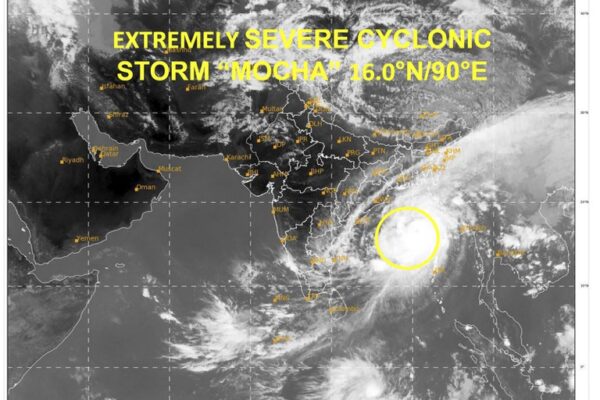Cyclone Mocha may have been less deadly than predicted, but it inflicted heavy damage on Myanmar’s Rakhine state, including the capital of Sittwe. On Monday, a day after the storm slammed into the coast, images from the city and surrounding area showed flattened homes, roads blocked by fallen electricity pylons, splintered remains of trees and widespread flooding. Power was cut off to Sittwe, a city of about 150,000. “Ninety percent of Sittwe township … is damaged or under debris,” aid and relief groups told Radio Free Asia. A precise death toll was hard to nail down. At least 30 people are believed dead, based on reports by local media and residents of the affected regions. Myanmar’s junta had said three people died, while the shadow National Unity Government – made up of opponents of the junta – put the figure at 18. Those figures are far lower than feared. Cyclone Nargis, which hit the same area in 2008, left nearly 140,000 dead or missing. The storm hit the coast on Sunday with sustained winds reaching over 220 kilometers per hour (137 mph). “Buildings have been badly damaged,” said a woman who lives in the Sittwe’s Lanmadaw (South) ward, asking not to be identified. “The monastery in front of my house is completely destroyed. Not one house is left undamaged.” The low-lying areas of Sittwe were inundated with flooding, she said, leaving residents to contend with brackish and, in some places, chest-deep water from the Bay of Bengal. “Piles of mud have been left inside the buildings,” she said. “Since there is no electricity, we haven’t been able to clean them … The roof of my house is almost gone and there is water downstairs. We don’t know what to do to clean them up.” Local residents stand on a broken bridge at the Khaung Dote Khar Rohingya refugee camp in Sittwe, Myanmar, Monday, May 15, 2023, after cyclone Mocha made a landfall. Credit: AFP A Sittwe firefighter told RFA that floodwaters in the city were “still as high as 1.5 meters (5 feet) in the low-lying areas” and that evacuated residents were waiting for word from the Rakhine state government to return to their homes. Impact in Bangladesh Meanwhile, in neighboring Bangladesh’s Cox’s Bazar to the west, some 1.2 million Rohingyas living in refugee camps after fleeing a military offensive in Rakhine state in 2017 remained largely unscathed by the cyclone, despite earlier fears that the mostly unprotected camps lay directly in the storm’s crosshairs. But while no casualties were reported in the aftermath of the cyclone, Rohingya refugees told RFA that thousands of homes were damaged in the sprawling camps due to strong winds, landslides, and flooding. “About 500 homes were damaged in our camp alone,” said Aung Myaing, a refugee at the Kutupalong camp in Cox’s Bazar. “About 10,000 homes in all refugee camps combined have been damaged. Some houses have been completely destroyed while others have been partially damaged.” He said camp residents are in need of bamboo and tarps to help shore up the damage. RFA-affiliated BenarNews reported that Mocha had destroyed more than 2,800 shelters, learning centers, health centers and other infrastructure in refugee camps in the neighboring sub-districts of Teknaf and Ukhia, citing Mohammed Mizanur Rahman, refugee relief and repatriation commissioner. He noted that landslides were also reported at 120 spots in the Rohingya camps. Rahman said there were no casualties because “we relocated them at an appropriate time.” ‘Trail of devastation’ In a flash update on Monday, the United Nations Office for the Coordination of Humanitarian Assistance called Mocha “one of the strongest cyclones ever to hit the country” and said the storm had left a “trail of devastation” in Rakhine state, which is also home to tens of thousands of people displaced by conflict in the aftermath of the military’s Feb. 1, 2021, coup d’etat. “Few houses have escaped damage in Sittwe and there is widespread destruction of flimsy bamboo longhouses in displacement camps,” UNOCHA said. “Health, relief items, shelter, and water, sanitation, and hygiene needs are already being reported. Explosive ordnance risks are high in conflict-affected rural areas where landmines may have been shifted during flooding and where people have been on the move to safer areas.” A downed tree lies on a building in Sittwe, Myanmar, Monday, May 15, 2023. Credit: Citizen journalist Damage to telecommunications towers has severely hampered the flow of information in Rakhine, while water and power services were disrupted throughout the day on Monday, forcing residents to rely on generators for electricity. Relief efforts underway UNOCHA said humanitarian partners are starting assessments to confirm the magnitude of the damage in Sittwe and the Rakhine townships of Pauktaw, Rathedaung, Maungdaw, Ponnagyun, and Kyauktaw. It called for “an urgent injection of funds” to respond to the impact of Mocha and subsequent flooding in the region. In a response to emailed questions from RFA, the World Food Program said it is “mobilizing emergency food and nutrition assistance to 800,000 people affected by the cyclone, many of them already displaced by conflict.” Before the cyclone, the U.N. had estimated 6 million people were “already in humanitarian need” in Rakhine state, and the regions of Chin, Magway and Sagaing. Collectively, the states host 1.2 million displaced people, prompting OCHA to warn of “a nightmare scenario.” However, Mocha had weakened by Sunday evening and moved toward Myanmar’s northwest, where it was downgraded to a depression on Monday over the country’s Sagaing region. RFA was able to document the deaths of at least a dozen people. They included a 30-year-old woman from Rakhine’s Ramree township, two men in their 20s in Ayeyarwady region’s Yegyi township and Rakhine’s Toungup township, and four men of unknown ages in Rakhine’s Kyauktaw township. Others killed included a resident of Sittwe, a man in his 50s from Mandalay region’s Pyin Oo Lwin township, a young couple from the Shan state city of Tachileik, and a 70-year-old woman from Magway region’s Sinphyukyun township. Attempts by RFA to contact…





